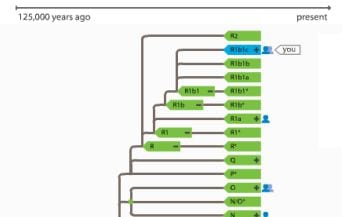
The American Society for Human Genetics (ASHG) has released a statement outlining a set of recommendations for genetic ancestry testing.
At a press briefing on Thursday, members of the ASHG Ancestry Testing Task Force Committee discussed two main themes: the need for clear communication about the limitations of genetic ancestry testing, and the need for researchers and companies doing this type of testing to engage with the social sciences to put results in context.
Michael Bamshad of the University of Washington School of Medicine discussed at length the need for people to understand that ancestry assignments based on genetics are inherently uncertain and can be affected by several factors, including the reference populations used in the analysis, the type and number of genetic markers analyzed, and the statistical methods employed.
ASHG president Aravinda Chakravarti further emphasized that questions about the “accuracy” of genetic ancestry testing are aimed at the interpretation of the genetic data, not at the actual DNA analysis.
Task force co-chair Charmaine Royal of the Duke University Institute for Genome Sciences and Policy addressed the committee’s concerns about the psychological impacts of genetic ancestry testing, especially as related to issues of identity.
23andMe Senior Director of Research Dr. Joanna Mountain had a chance to talk with some of the members of the ASHG Ancestry Testing Task force about their statement.
“Members of the panel emphasized to me that their primary goal was to raise a set of concerns around identification of ancestry through genetics,” said Mountain.
“Because several of us at 23andMe were previously aware of these concerns, we developed our ancestry features with those concerns in mind. For instance, we consider a large number of markers for all the chromosomes of the human genome, including the mitochondrial genome. We also avoid being overly precise in reporting an individual’s ancestry. And we are currently creating educational tools to help our customers understand how genetic information can be informative about ancestry.”
The speakers stressed several times that their statement was not aimed just at consumer companies offering genetic ancestry testing, but also at academic researchers in the field.
Unfortunately, Mountain said, the ASHG guidelines leave out some of the potential benefits of ancestry genetic testing.
“For instance, ASHG President-Elect Ed McCabe encouraged the audience to ask their family elders about family history over Thanksgiving, as an alternative to learning about ancestry through genetics. But individuals who have signed up for 23andMe’s service may find themselves far more motivated to discuss family history than they would before seeing their genetic data.”
For a more thorough analysis from a genetic genealogist’s point of view, click here.
McCabe said the statement released this week is a preliminary document. The committee expects to issue a more detailed report in Spring 2009.